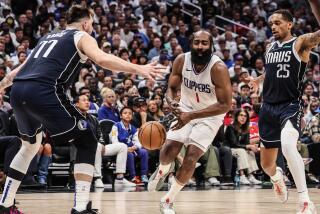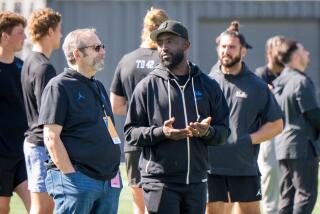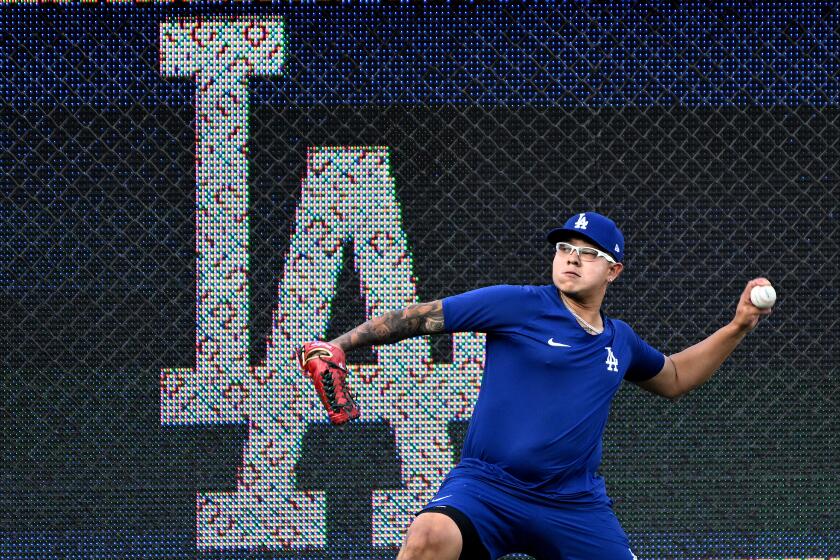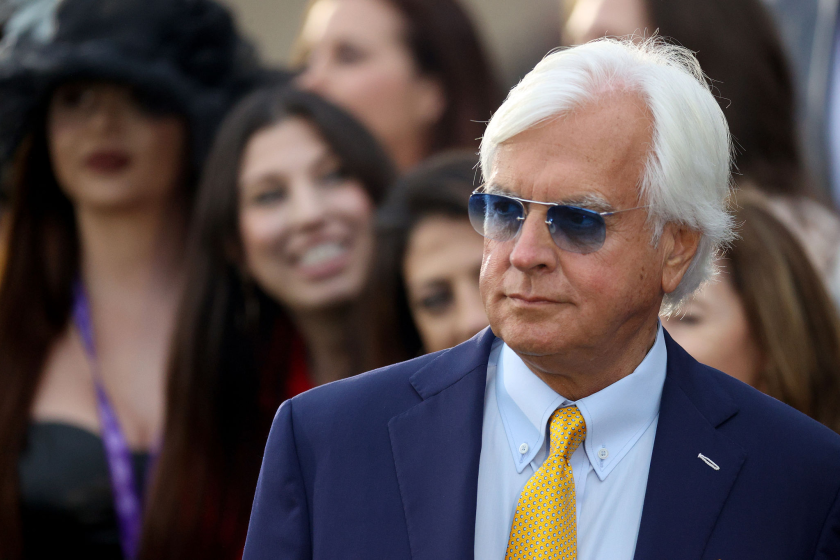Bonds market is nonexistent
The television commercial promoting this year’s All-Star game is about as close as Barry Bonds will get to hitting one out of the park for a corporate sponsor.
What’s unusual about the 60-second spot isn’t that rival American and National League cable cars race down the famed San Francisco hills and crash into McCovey Cove. It’s the face of Bonds at the start of the ad. The man who is closing in on Hank Aaron’s career home run record -- and fending off allegations of steroid abuse -- is shown with a smile rather than the more customary scowl.
Not surprisingly, Bonds’ march toward baseball history has failed to attract lucrative corporate sponsorships and potentially lucrative advertising deals. And, unlike Shoeless Joe Jackson, who has staged something of a posthumous public relations rebound, history may not be kind to Bonds.
“You have to write it up as a kind of a tragedy, I guess, because we’re talking about the most hallowed record in all of baseball,” said Bob Dorfman, a San Francisco-based advertising agency executive who compiles the quarterly Sports Marketers’ Scouting Report. “You think about what could have been. Certainly, a guy who had done it differently, perhaps been nicer about it, could have been huge.”
Bonds, who at 751 home runs is only five short of a new record, has a reputation as a prickly person off the field, according to sports marketers. And that public persona was fairly well established even before the steroids controversy erupted in 2003, which triggered a federal investigation that is ongoing.
“Endorsements from someone nobody likes are meaningless,” said Mark Roesler, president of CMG Worldwide, which represents the marketing interests of living players as well as the estates of some past sports giants. “Consequently marketers are not going to want to use Bonds.”
Sports marketers instead gravitate toward players whose personalities click with fans. “For a while, everyone who needed a baseball player was looking first to Cal Ripken Jr.,” Dorfman said.
Bonds can be polarizing, as evidenced by a CBS News-New York Times poll released Tuesday that shows the public is divided when it comes to rooting for Bonds to break Aaron’s record. The poll was conducted among a random sample of 1,125 adults nationwide May 18-23.
Of those surveyed, 40% said they are rooting for him, while 38% said they aren’t. When broken down by race, blacks are strongly pulling for him -- 57% -- while only 29% of whites are. Even among those surveyed who identified themselves as baseball fans were split -- 52% said breaking the record would be good for baseball. The poll has a margin of error of three percentage points.
Fan discontent has been evident in the demand for, and the value of, Bonds merchandise. Demand hit a high in 2001 before plummeting in 2003, according to Doug Allen, president of Mastro Auctions, a Burr Ridge, Ill.-based auction house.
So Bonds began his own marketing, and as a result is poised to profit from Tuesday’s All-Star game appearance and his closely monitored push toward Aaron’s record.
The 43-year-old player has established a licensing company to leverage his bid to become MLB’s newest home run king. He has 18 partners, including apparel manufacturers and a company that sells commemorative coins and expensive, framed photos of the slugger.
Bonds’ website, barrybonds.com, sold out its supply of hickory bats ($750 each) as well as an autographed glove from the 1998 season that was auctioned off at $5,000. Still on the shelves: a bat autographed by Bonds and Willie Mays ($2,000) and an autographed glove from the 2000 season (listed at $5,000).
Other than a baseball trading card deal with the Topps Co. Inc., Bonds’ $2 million in estimated off-the-field revenue is driven largely by licensing deals.
“It’s all merchandise,” Dorfman said, “commemorative balls, shirts, hats. Items that some people still want, particularly in San Francisco.”
It wasn’t always this way. About five years ago, Bonds established sponsorship deals with Charles Schwab Corp., Fila, and a restaurant company.
A 2002 Schwab commercial even paired Bonds and Aaron. The scene opened with Bonds taking batting practice alone and knocking one after another out of the park. A whispery voice can be heard -- think “Field of Dreams” -- urging Bonds to consider retirement and to stop chasing an old-timer’s record. Bonds looks up and hollers, “Hank, would you cut it out already?” The camera pans to the announcer’s booth to show Hank Aaron at the microphone.
Since then, however, corporate advertisers have shunned him.
Even if Bonds were viewed as a natural for sports marketing deals, baseball players generally can’t command the big paychecks that some athletes earn.
Sports Illustrated recently reported that the Yankees’ Derek Jeter topped the MLB endorsement list with deals valued at $7 million. In contrast, the value of NBA star LeBron James’ marketing deals is estimated at $25 million, and Tiger Woods’ sponsorship take is believed to be about $100 million.
It’s uncertain, Roesler said, whether Bonds’ image will improve with the passage of time -- a process that can soften rough edges and push an athlete’s accomplishments to the forefront.
“History has been kind to Shoeless Joe Jackson,” said Roesler, whose firm represents the estates of several deceased athletes, including the player who was entangled in the historic Black Sox scandal. “As time passed we have romanticized him, made him more of a victim, used by others who stood to profit from fixing that World Series.
“Bonds, unlike Jackson, is by all accounts not a humble man, and so history is not going to treat him very well,” Roesler said. “He’s no victim. Nor is he humble.”
If there’s a sports marketing role model for Bonds, it could be George Foreman, now known by younger consumers for his popular kitchen grill rather than his boxing career.
The boxer wasn’t plagued by scandal during his career, but he was an unpopular champion.
“Yet he somehow reinvented himself,” Roesler said. “During his career he was a completely different kind of person. Now everyone likes him. Few athletes have ever been able to so successfully reinvent themselves.”
--
More to Read
Get our high school sports newsletter
Prep Rally is devoted to the SoCal high school sports experience, bringing you scores, stories and a behind-the-scenes look at what makes prep sports so popular.
You may occasionally receive promotional content from the Los Angeles Times.






